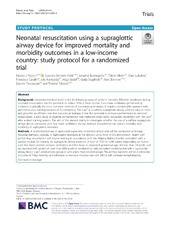Neonatal resuscitation using a supraglottic airway device for improved mortality and morbidity outcomes in a low-income country: Study protocol for a randomized trial
Pejovic, Nicolas; Höök, Susanna Myrnerts; Byamugisha, Josaphat; Alfvén, Tobias; Lubulwa, Clare; Cavallin, Francesco; Nankunda, Jolly Kaharuza; Ersdal, Hege Langli; Segafredo, Giulia; Blennow, Mats; Trevisanuto, Daniele; Tylleskär, Thorkild
Peer reviewed, Journal article
Published version

View/
Date
2019-07-19Metadata
Show full item recordCollections
Original version
https://doi.org/10.1186/s13063-019-3455-8Abstract
Background: Intrapartum-related death is the third leading cause of under-5 mortality. Effective ventilation during neonatal resuscitation has the potential to reduce 40% of these deaths. Face-mask ventilation performed by midwives is globally the most common method of resuscitating neonates. It requires considerable operator skills and continuous training because of its complexity. The i-gel® is a cuffless supraglottic airway which is easy to insert and provides an efficient seal that prevents air leakage; it has the potential to enhance performance in neonatal resuscitation. A pilot study in Uganda demonstrated that midwives could safely resuscitate newborns with the i-gel® after a short training session. The aim of the present trial is to investigate whether the use of a cuffless supraglottic airway device compared with face-mask ventilation during neonatal resuscitation can reduce mortality and morbidity in asphyxiated neonates. Methods: A randomized phase III open-label superiority controlled clinical trial will be conducted at Mulago Hospital, Kampala, Uganda, in asphyxiated neonates in the delivery units. Prior to the intervention, health staff performing resuscitation will receive training in accordance with the Helping Babies Breathe curriculum with a special module for training on supraglottic airway insertion. A total of 1150 to 1240 babies (depending on cluster size) that need positive pressure ventilation and that have an expected gestational age of more than 34 weeks and an expected birth weight of more than 2000 g will be ventilated by daily unmasked randomization with a supraglottic airway device (i-gel®) (intervention group) or with a face mask (control group). The primary outcome will be a composite outcome of 7-day mortality and admission to neonatal intensive care unit (NICU) with neonatal encephalopathy. Discussion: Although indications for the beneficial effect of a supraglottic airway device in the context of neonatal resuscitation exist, so far no large studies powered to assess mortality and morbidity have been carried out. We hypothesize that effective ventilation will be easier to achieve with a supraglottic airway device than with a face mask, decreasing early neonatal mortality and brain injury from neonatal encephalopathy. The findings of this trial will be important for low and middle-resource settings where the majority of intrapartum-related events occur.
